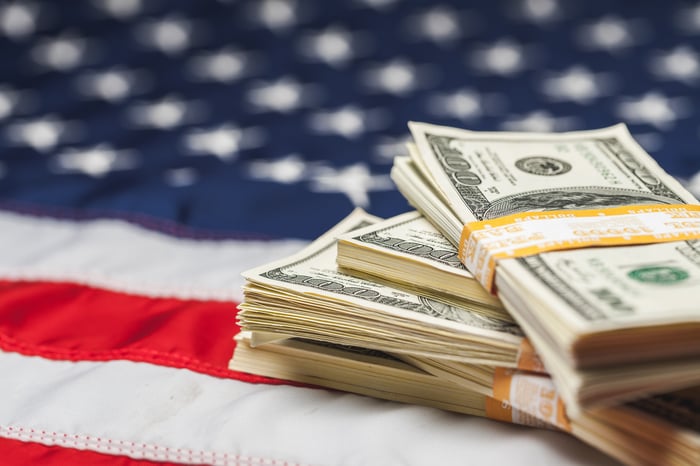The stock market may be volatile at times, and it certainly doesn't go up every year. But when examined over the long run, there's arguably not a better wealth creator on the planet.
Since 1980, investing in an S&P 500 tracking index would have yielded an average annual total return, including dividends, of more than 11%. In other words, you're doubling your money in less than seven years, with dividend reinvestment.
The best thing about putting money to work in the market is that you don't need to start with a fortune to end up making one. It's simply a matter of buying game-changing companies and hanging onto those investments for a very long time.
If you're ready to chart your path to financial independence, the following four unstoppable stocks can help you reach your goal.

Image source: Getty Images.
Square
Ready or not, we're witnessing a war on cash and a payments revolution take shape before our eyes. When the dust settles, fintech stock Square (SQ -1.97%) should come out as one of the leading providers of cashless/digital payments.
Square is likely best-known for its seller ecosystem. This is the segment that provides point-of-sale devices, analytics, loans, and other tools to help businesses grow. In the seven years leading up to the pandemic, the gross payment volume (GPV) on its network catapulted from $6.5 billion to $106.2 billion. While the seller ecosystem has long targeted smaller merchants, GPV trends show that larger merchants (those with annualized GPV above $125,000) now account for a majority of all GPV on the network. Bigger merchants should translate to higher gross profit over time.
But make no mistake about it, the star of the show is digital peer-to-peer payments platform Cash App. Between the end of 2017 and the end of 2020, Cash App's monthly active user count grew more than 400% to 36 million. This hypergrowth payments platform is allowing Square to generate revenue from merchant fees, transfers, and investments (including Bitcoin exchange). With Square bringing in $41 in gross profit per Cash App user and spending less than $5 to attract each new user, the profit potential here is insanely high.

Image source: Getty Images.
Vertex Pharmaceuticals
Biotech stocks are a dime a dozen. But a profitable, cash-rich biotech company with a successful track record of developing drugs for hard-to-treat diseases ... that's a description encapsulating Vertex Pharmaceuticals (VRTX 0.10%).
Where Vertex has really made its mark is in treating cystic fibrosis (CF) -- a genetic disease characterized by thick mucus production that can obstruct the lungs and pancreas. Despite there being no cure for CF, Vertex has developed multiple generations of gene-based CF therapies, each providing improved lung function for patients. The latest, combination therapy Trikafta, was approved by the U.S. Food and Drug Administration five months ahead of schedule. At its peak, this drug that targets about 90% of CF patients could see $6 billion (or more) in annual sales.
Developing a long line of successful treatments in a hard-to-treat space has allowed Vertex to build quite the war chest. It ended March with $6.9 billion in cash and cash equivalents, which is more than enough to fund its research into nearly one dozen internally developed compounds. What's more, this cash will likely be used to acquire other therapies and diversify Vertex's revenue channels.

Image source: Getty Images.
CrowdStrike Holdings
Like Square, cybersecurity stock CrowdStrike Holdings (CRWD 0.14%) finds itself at the center of a rapidly growing and transformative industry. With the pandemic moving businesses online and into the cloud faster than ever before, the need to protect enterprise and consumer data from orchestrated attacks is even more pronounced. That's where CrowdStrike steps up.
CrowdStrike's cloud-native Falcon platform is a standout. Reliant on artificial intelligence and built in the cloud, Falcon is designed to be faster and more efficient than on-premises security solutions at identifying and responding to threats. In a given week, Falcon oversees 6 trillion events, which is allowing the service to grow exponentially smarter over time.
The proof of Falcon's success can be plainly seen in CrowdStrike's operating performance. It's retaining 98% of its clients and had 64% of its customers purchase at least four cloud module subscriptions in the fiscal first quarter (that's up from 9% four years earlier). Cybersecurity-based subscription margins are already juicy -- and they get even more delectable when existing clients are spending more each year. Despite still being in the early stages of its growth, CrowdStrike has already hit its long-term subscription gross margin target.

Berkshire Hathaway CEO, Warren Buffett. Image source: The Motley Fool.
Berkshire Hathaway
A proven way to make money for more than five decades has been to ride the coattails of Berkshire Hathaway (BRK.A 0.64%) (BRK.B 0.54%) CEO Warren Buffett. Since taking the helm at Berkshire in the mid-1960s, Buffett has led his company to an annual average return of 20%. In aggregate, we're talking about a gain of more than 2,800,000%, as well as the creation of over $500 billion in value for shareholders.
Let's state the obvious: When you buy a stake in Berkshire Hathaway, you're allowing Warren Buffett to manage a slice of your portfolio. Buffett isn't infallible, but he does a lot of things as an investor that yield positive results. He buys stakes in companies with clear-cut competitive advantages, and he sticks to industries and sectors that he knows inside and out. Most importantly, the Oracle of Omaha buys with the intent of holding for a very long time.
Warren Buffett is also a big believer in the numbers game. In other words, while recessions are a normal part of the economic cycle, they tend to be short-lived. Comparatively, periods of economic expansion usually last for years. Buffett has anchored Berkshire Hathaway's more than $300 billion investment portfolio with cyclical companies from the tech, financials, and consumer staples spaces that will undoubtedly benefit from these long periods of economic expansion.





